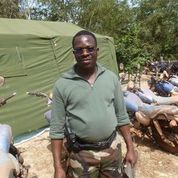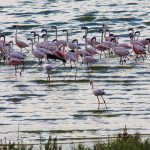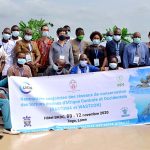Interview of Benjamin Bassono
Mr. Benjamin BASSONO you are the Executive Director of the association « Les Anges Gardiens de la Nature » (Burkina-Faso) can you present us a little bit your association?
The Association of the Eco-Guards of Burkina Faso called » LES ANGES GARDIENS DE LA NATURE » (AGN) is a national non-profit association officially born in 2018. It results from the reconversion of the Association for the Valorization of Local Products (AVPL) born in 2002.
It was created in order to bring together within the same structure the people trained within the framework of the presidential decree on the terms and conditions for the recruitment of eco-guards and the conditions for exercising their profession in Burkina Faso.
AGN’s main objective is to protect the fauna, flora and those who defend it: the eco-guards. To do this, the association has developed particular expertise in the professionalization of eco-guards, with a focus on their training and equipment. AGN provides environmental education and also works to promote eco-tourism and sustainable modes of consumption and production.
When and under what circumstances did you personally make the commitment to Nature?
I come from a Gourounsi family from the province of Sanguié, Burkina Faso. I am the grandson of a great cattle and horse breeder; from the age of 6, I spent my vacations with my grandparents in the village of Réo (more precisely in Goumédyr) where I was born. There, my pleasure was to accompany as regularly as possible the shepherds in charge of grazing the herds. We would leave in the morning and only return in the evening. The shepherds had to hunt every day to ensure their midday meal. Until the age of 12, I learned at their side. It was with them that my bush soul was forged. It has never left me since.
What do you think is AGN’s greatest victory?
AGN’s greatest victory was to have succeeded in developing and accepting the ecoguard profession in Burkina Faso.
Who is the person who is currently your source of inspiration and why?
Michel Vallier. French taxidermist naturalist of Etablissements Vallier.
Mr. Vallier gave 50 years of his life to travel through Africa to train wildlife actors in ecological monitoring and preparation of hunting trophies. He has set up several eco-museums in Africa for the environmental education of students.
He was for a long time the defender of our countries with the world authorities of wildlife management. He leaves us in 2019.
If you were an animal you would be? Tell us why?
If I were an animal I would be a LION. The Lion exudes a certain aura and exerts fascination, domination and authority over his entourage.
The native of the Lion has the soul of a leader, but of those leaders with a big heart and unfailing loyalty, like the famous king « Richard the Lionheart ». Very energetic, courageous and strong, and above all optimistic, the Lion is often surrounded by friends and loyal admirers.
Leo generally enjoys robust health and an iron mind.
If you had a magical power, what would you want to change?
Go back 50 years to find a healthier biodiversity. Indeed, the loss of biodiversity due to human activities has accelerated over the past 50 years. Unfortunately today, this trend is increasing and with it the disappearance of ecosystems.
According to several sources, 25% of the world’s species will have disappeared before 2050 due to the combination of global warming and human activities .
What advice would you give to young Africans who want to get involved in community life for the benefit of Nature like you?
Avoid the mistakes of their elders!
I believe that these young people will first and foremost have to think about taking biodiversity into account in all development strategies. Indeed, until now, education systems continue to fragment and disjoin the knowledge that should be linked. Thus, we form one-dimensional and reducing minds, which privilege only one dimension and obscure the others.
At recent major regional meetings in Africa, governments have expressed their failure to meet the 2010 biodiversity targets.
According to them, sectors such as agriculture, fisheries, economy and tourism do not sufficiently integrate biodiversity issues, which is also the case in many other sectors, apart from those directly related to biodiversity and environmental issues in general.
Nowadays, the design of policies relating to biodiversity conservation, whether at the global, national or local level, dictates the precondition for what Morin et al. (2003) call « perceiving the interactions and feedbacks where economic, political, social, national, ethnic, religious, mythological processes that weave the planetary destiny are mixed and interfered with ».
Unfortunately, the education systems that have trained most of the elites currently in charge of developing and implementing biodiversity conservation policies have not imagined integrating the need for the emergence of minds capable of grasping fundamental global problems and understanding their complexity into the learning process.




